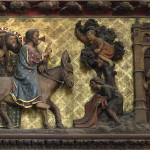We run our website the way we wished the whole internet worked: we provide high quality original content with no ads. We are funded solely by your direct support. Please consider supporting this project.

Q&A: When Confronting Unambiguous Evil
Q: I read your post on Abortion. I found it compelling and am considering moving toward that kind of a position on the matter. I am also reading “Uncle Tom’s Cabin” for the first time and wonder if Boyd’s response to slavery (were it currently an issue as abortion is today) would be a similar approach to his stance on abortion?
A: Thanks for the question. I can’t say that I’d have taken the “same approach” toward slavery if I’d lived in pre-abolition America as I now take on the abortion issue because the two issues strike as me as very different in nature. As I illustrated in my essay, there are a litany of questions that have always surrounded the abortion issue. Good and intelligent people have always had differences of opinion on these matters, even when they have shared the same Christian faith. I see no such ambiguity surrounding slavery, however. One group of humans is simply enslaving and thereby de-humanizing another group of humans. I thus see slavery as an unambiguous evil, and when this sort of evil is harming people, I believe followers of Jesus must do everything possible to bring this harm to an end, so long as our actions are consistent with the teachings and example of Jesus.
It’s of course true that there were plenty of “good and intelligent” Southerners in pre-abolition America who didn’t see slavery as an unambiguous evil. They simply felt it was self-evident that white Europeans were superior to Africans and that God had given them the right to enslave them. Were I living at this time, believing exactly as I do today, I would certainly try to reason with these people. But to the extent that they continued to disagree with me, I wouldn’t chalk this up to the ambiguity of the issue. I would rather have no choice but to chalk it up to their spiritual blindness, and I would thus do everything in my power, within the parameters of Christ’s teaching and example, to bring an end to the terrible suffering this blindness was causing others.
This means that, while I would not have fought in the war, I would have used whatever influence I had to move government to end slavery. I see nothing in the New Testament that requires me to believe that it’s inherently wrong to talk to government when doing so might bring about some good. Indeed, the book of Acts indicates that there were a number of times when Paul spoke to governmental authorities (Acts 16:37- 39; 21:37-40; 24:24-25; 25:8-10; 26:1-29). At the same time, I wouldn’t regard my attempt to influence government as a distinctly Kingdom activity. Nor would I think this is where my focus should be or where my confidence should lie.
As a follower of Jesus, I would have thought my focus and confidence should rather reside in the way I and other believers could enter into solidarity with, and sacrificially serve, those who were being harmed by the evil of slavery. Many at the time did this. There were multitudes of Christians who held prayer vigils to end slavery. While non-believers may mock prayer as a waste of time, we who are citizens of the Kingdom know that it is, as Walter Wink once said, a revolutionary form of social action. There were also many who risked their lives to work in the “underground railroad” to free slaves. And there were others who boycotted businesses that had any connection with the slave trade and who refused to buy clothing or blankets that were manufactured with cotton picked by slaves. I would hope I would have been among these faithful Christians.
To turn to a more contemporary example, I believe that the way Martin Luther King Jr. went about fighting the evil of Jim Crow laws in the 50’s and 60’s ingeniously displayed a unique kingdom approach to social issues. He instructed all who wished to join in his marches that they were not to do so unless they could honestly say they loved their “enemies” and were marching with the goal of freeing white oppressors from their bondage as well as for the blacks they were oppressing. So too, he instructed all participants that, regardless of what happened to them, they were to never respond violently.
As we all know, multitudes suffered because of their commitment, as did Christ. But it was this suffering that exposed the injustice of the demonic system they were under and that ultimately brought about change. That, I believe, is a distinctly kingdom way of bringing about change, for it’s a way that reflects the enemy-loving non-violence of Jesus.
When confronting unambiguous evil, its appropriate to use whatever influence you have to influence government, so long as it does not violate our calling as followers of Jesus. But our focus, and our confidence, must not reside here. It ought to rather reside in that unique kingdom power that is unleashed when the people of God imitate their Lord by being willing to enter into solidarity with oppressed brothers and sisters and to bleed on their behalf.
Related Reading

Palm Sunday, Partisan Politics & the Power of the Cross
Today we’re sharing something from David D. Flowers that we found especially insightful as we approach holy week. We hope it blesses you and moves you to more fully manifest the kingdom that is not of this world. ~~~ We remember it in the church as Palm Sunday. This is the triumphal entry of Jesus into…

Is Telling Christians to Avoid Politics Like Telling Them To Avoid Hospitals?
In this episode Greg clarifies how politics can be dangerous and why some people might want to avoid it. http://traffic.libsyn.com/askgregboyd/Episode_0045.mp3

Podcast: When Does Life Begin?
Greg confronts a highly controversial topic from a Kingdom perspective. http://traffic.libsyn.com/askgregboyd/Episode_0455.mp3

A Kingdom Not of This World
Bruxy Cavey spoke at Woodland Hills Church back in May as a part of the Tapestry series, and this is a little snippet of his sermon. It’s a wonderful description of the Anabaptist approach to politics. Take a look!

A Response to Tony Campolo on Fighting the Powers
While I have nothing but admiration for Tony Campolo, I differ with his views on how Christians are to be change agents in the world. He has always been a strong proponent of Christians bringing about change by political means. I, on the other hand, am not in principle opposed to Christians engaging in politics,…

